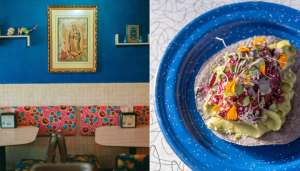In 2015, Ralat co-edited a taco feature for Texas Monthly. He liked it so much that he immediately took on a job that didn’t exist. He was turned down. Repeatedly. But Larratt didn’t give up.

“After freelancing for the magazine several times, I got the job. …… It was a four-year-long debate.”
That’s a very unique title, and Ralat says he’s the only taco editor in the U.S. and the world. After he took that position, the University of Texas Press published Ralat’s book, “The American Tortilla: A History and Guide,” in 2020.
While José Ralat enjoys the taco part of his work, he concludes that it’s really about how food relates to culture and people.
Courtesy of José Ralat
Larratt says his duties at Texas Monthly go far beyond eating tacos and grading them.
“Yes, I do criticism. Yes, I do trend singles. My stories are ostensibly about food, but more than that, they’re about people.”
“Why the tacos as an entry point? I was looking for something that was missing in journalism. But there’s also something I’m really passionate about that connects my personal life to my professional career.
“I got into the industry mainly because I fell in love with a young Mexican-American woman from Texas. She introduced me to breakfast tacos, and she completely forced me to eat beef tongue. …… I was obsessed with the food and the girls,” Ralat said.
All of which makes Ralat the perfect place to observe and critique Texas’ taco culture, which was born out of its long history of intertwining with Mexico.
How Austin turned things around
When it comes to food, “Austin is a small Tex-Mex town that has been diverse until recently,” Ralat says.
“For example, they like to eat breakfast tacos.” Breakfast tacos didn’t appear in Austin until about the late 1970s, he said. “Meanwhile, in the ’50s and earlier, people were eating them in the Rio Grande Valley and San Antonio, which borders Mexico,” Ralat said.
All of these major tourist and media attractions have given coastal elites a very narrow view of Austin.
José Ralat, Texas Monthly Tortilla Editor
Austin’s reputation for breakfast tacos “stems from the commercialization of South by Southwest, where technology companies have opened offices. …… All of these major tourist and media draws give the coastal elite a very narrow perception of Austin.”
But things are looking up. Larratt says 2019 is a turning point for Austin to become a better taco town.
“What’s happening now is that you have a small community of young taqueros and chefs who have decided to combine their talents and focus on quality while ignoring the noise.”
A photo of the interior of Nixta Taqueria and a tartar beet fritter.
Isaac Obioma / Dimitri Stasevski
Take Nixta Taqueria in Austin, for example. It specializes in handmade tortillas, using an alkaline cooking process used by the indigenous people of Mexico before the Spanish conquest.
“The filling is mainly vegetarian. They do great things with beets. There’s something wonderful about cauliflower. They’re always trying new things. It’s a far cry from Texas, which is a meat state.”
What inspires these vegetarian tendencies?
I grew up in Visalia, California, which is near Fresno, the salad bowl of America,” says Nixta’s chef Edgar Rico, via emai. I also spent my formative years in Los Angeles, where there are unparalleled farmers’ markets. …… I’m obsessed with making vegetables taste as good as a piece of meat – if not better.”
Eva Longoria’s 4 recipes inspired by her Mexican roots
Rico’s favorite vegetable is beet “tartar” fritters, “because people don’t tend to like beets very much. This recipe is very useful because it takes something that’s usually not cooked well in cooking. …… When we add salsa, horseradish, avocado cream and other aromatics, it adds more of a roasted flavor to the beets and turns the dish into this beautiful, fresh bomb.”
Nixta isn’t the only new game in town.
Ralat also shouted out Cuantos Tacos, which specializes in “magical” Mexico City-style empanadas.
Founder and owner Luis “Beto” Robledo tells CNN Travel that his main focus “is to bring tacos to Texas as close to Mexico City style as possible.
He went back and forth to Mexico City for a few years to see how things were done, and opened his store in 2019. Finding the right tortillas was crucial for Robledo.
“Luckily, we found some at a small husband-and-wife store in San Antonio. …… I knew these were the tortillas I needed for my business. They were worth the effort to get those alkaline tortillas to Austin, he said.






























